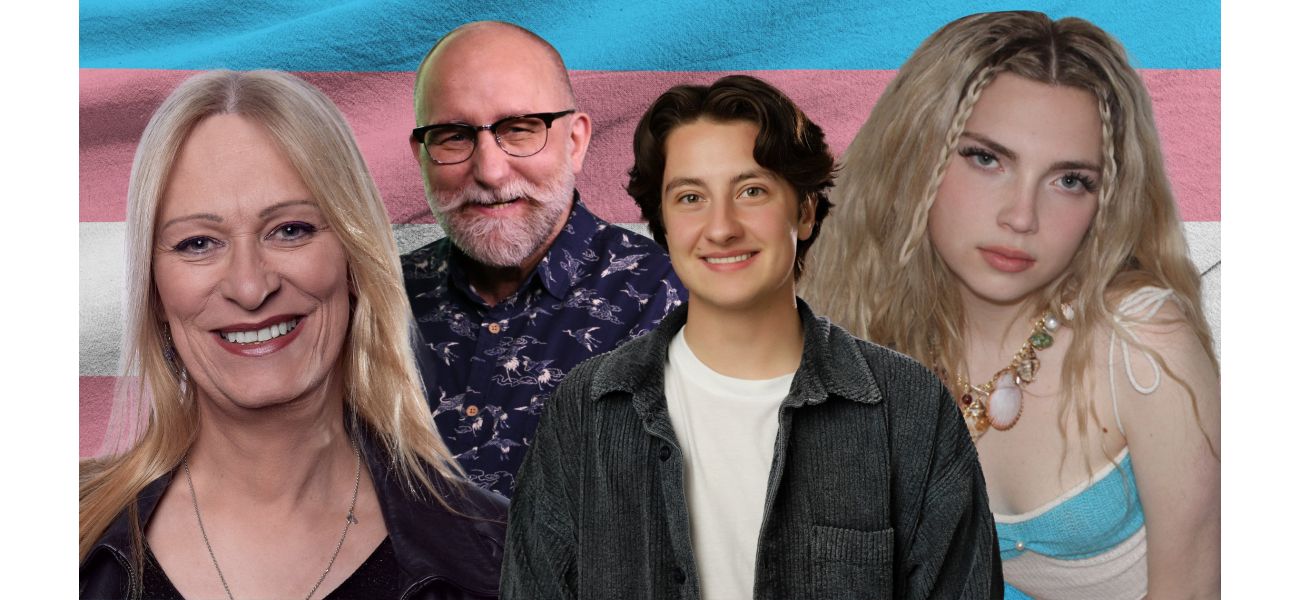Coming out as trans in the 70s was a hopeless experience.
Transgender Awareness Week is a week-long event starting on December 13th to raise awareness for transgender individuals.
November 17th 2024.

Metro recently had the opportunity to speak with both transgender youth and elders about their experiences. Bobbi Pickard, now 55 years old, recalls her journey of coming out as a transgender woman. She explains that when she first came out, there was limited access to information and resources. The internet and mobile phones did not exist, and there was very little knowledge about the transgender community. As a result, Bobbi struggled to understand and accept her own identity.
From a young age, Bobbi knew she was different. At just three years old, she recognized her true gender and desired to live as her authentic self. However, in a society where being transgender was not accepted, Bobbi had to hide her true identity and live in isolation and fear. She explains that during her generation, there were no role models or support systems for transgender individuals. As a result, Bobbi has spent most of her life living in the shadows.
Research has shown that transgender individuals face higher rates of mental health struggles, which can lead to a higher risk of suicide. The long wait times for gender-affirming care in the NHS, coupled with hate crimes and violence against trans people, only add to the distress. Despite these challenges, Bobbi has dedicated her life to advocating for transgender visibility and inclusion. She is currently the CEO of Trans in the City, a non-profit organization that works towards increasing inclusivity for trans and non-binary individuals in the business world.
Stephen Whittle, now 69 years old, also faced similar setbacks in his journey as a transgender man. He has spent much of his life advocating for transgender and women's rights and was even made an OBE in 2005 for his work. Stephen recalls joining the first support group for transgender individuals in the UK in 1975 and later founding the UK's FTM Network. He also founded Press for Change, an organization that works to change laws and social attitudes surrounding transgender lives. Born into a working-class family and facing health challenges as a child, Stephen describes himself as a "natural survivor," especially in his journey as a transgender man.
Stephen first began questioning his gender identity at the age of 10 while participating in a school race. He had a sudden realization that he would always be in the wrong race and felt that his life had no future. When he confided in a GP about his identity, he was dismissed and told he would never receive the necessary treatment. Stephen was devastated and even considered taking his own life. However, his GP stood by him and provided him with the hormones he needed to transition. He also found support in his partner, Sarah, whom he describes as his best friend and biggest advocate.
Unlike the previous generation, today's transgender youth have grown up in a world with more resources, community, and language to express their identities. Tate Smith, for example, realized he was transgender at the age of 16. He grew up with two alpha male figures in his life and did not realize he was trans until he saw representation in celebrities like Laverne Cox. However, due to his family's disapproval, Tate spent years in the closet. It wasn't until he found a supportive community online and started hormone therapy that he was able to come out and live openly as a transgender man.
While the landscape for transgender individuals may have shifted, challenges still remain. Tate has faced discrimination in the workplace and has even been outed without his consent. However, he has also found success in his career as a consultant and public speaker, helping workplaces become more inclusive. Despite the difficulties, Tate describes his coming out journey as relatively straightforward, thanks to the support he found online and within the transgender community.
Metro speaks to transgender youth and elders about their experiences. Bobbi Pickard, 55, shares her story of coming out in a time when there was no internet or knowledge available for the LGBTQ+ community. She explains that from a young age, she knew she was transgender and wanted to live as her authentic self, but societal norms and expectations made it impossible for her to do so. She describes a childhood filled with isolation and fear, with no one to turn to for support or guidance.
Living openly as a transgender person was simply unthinkable at the time. Bobbi reflects that there were no role models or representation for transgender individuals in her generation, making it difficult for her to even understand her own identity. Despite facing challenges and discrimination throughout her life, Bobbi has managed to survive and thrive. She is now a Diversity Equity and Inclusion professional, as well as the CEO of Trans in the City, a non-profit organization working towards increasing inclusion for transgender and non-binary individuals in the business world.
Bobbi's journey of coming out has been a constant one, starting with telling a select group of people in 1991, then medically transitioning in 2015 before coming out in the workplace. She has spent a lifetime advocating for transgender visibility and rights, and her resilience and determination to live as her authentic self is truly inspiring.
Stephen Whittle, 69, from Altrincham, shares a similar story of facing setbacks and discrimination throughout his life. He has dedicated much of his life to advocating for transgender and women's rights, and was even made an OBE in 2005 for his work. Stephen joined the Manchester TV/TS group in 1975, the first support group for transgender individuals in the UK. He went on to found the UK's FTM Network and Press for Change, an organization that works towards changing laws and social attitudes surrounding transgender lives.
Growing up in a working-class family and suffering from rickets as a child, Stephen was never expected to live past six months. However, he describes himself as a "natural survivor", and has overcome countless challenges in his journey as a transgender man. Now a professor of equalities law at Manchester Metropolitan University, Stephen recalls first questioning his gender identity at the age of 10. He vividly remembers a moment in school where he realized he would always be in the wrong "race" during a boys and girls race. This realization led to feelings of hopelessness and a belief that his life had no future.
When Stephen finally confided in a GP about his identity, he was met with disbelief and rejection. However, with the support of his GP and his partner Sarah, who he describes as his best friend and biggest advocate, he was able to access the hormones he needed. Stephen and Sarah have now been married for 16 years and have four children together. Despite finding community and support in the LGBT scene and women's rights groups in the 70s and 80s, Stephen still faced discrimination and a lack of rights for transgender individuals.
For today's transgender youth, the landscape has shifted significantly. Unlike the previous generations, they have access to resources, community, and the language to express their identities. Tate Smith, for example, realized he was trans at the age of 16. Growing up with two alpha male figures in his life, Tate struggled to understand and accept his identity. It wasn't until he saw representation in the media, such as Laverne Cox, that he started to discover who he truly was. Despite facing challenges, such as disapproval from his family and workplace discrimination, Tate has built a successful career as a consultant and public speaker, advocating for inclusivity in the workplace.
While there is still a long way to go for transgender rights and acceptance, the landscape is slowly changing. Thanks to the tireless advocacy of individuals like Bobbi and Stephen, and the courage of young individuals like Tate, the transgender community is becoming more visible and accepted. With the continued efforts of activists and allies, we can hope for a more inclusive and understanding society for all individuals, regardless of their gender identity.
From a young age, Bobbi knew she was different. At just three years old, she recognized her true gender and desired to live as her authentic self. However, in a society where being transgender was not accepted, Bobbi had to hide her true identity and live in isolation and fear. She explains that during her generation, there were no role models or support systems for transgender individuals. As a result, Bobbi has spent most of her life living in the shadows.
Research has shown that transgender individuals face higher rates of mental health struggles, which can lead to a higher risk of suicide. The long wait times for gender-affirming care in the NHS, coupled with hate crimes and violence against trans people, only add to the distress. Despite these challenges, Bobbi has dedicated her life to advocating for transgender visibility and inclusion. She is currently the CEO of Trans in the City, a non-profit organization that works towards increasing inclusivity for trans and non-binary individuals in the business world.
Stephen Whittle, now 69 years old, also faced similar setbacks in his journey as a transgender man. He has spent much of his life advocating for transgender and women's rights and was even made an OBE in 2005 for his work. Stephen recalls joining the first support group for transgender individuals in the UK in 1975 and later founding the UK's FTM Network. He also founded Press for Change, an organization that works to change laws and social attitudes surrounding transgender lives. Born into a working-class family and facing health challenges as a child, Stephen describes himself as a "natural survivor," especially in his journey as a transgender man.
Stephen first began questioning his gender identity at the age of 10 while participating in a school race. He had a sudden realization that he would always be in the wrong race and felt that his life had no future. When he confided in a GP about his identity, he was dismissed and told he would never receive the necessary treatment. Stephen was devastated and even considered taking his own life. However, his GP stood by him and provided him with the hormones he needed to transition. He also found support in his partner, Sarah, whom he describes as his best friend and biggest advocate.
Unlike the previous generation, today's transgender youth have grown up in a world with more resources, community, and language to express their identities. Tate Smith, for example, realized he was transgender at the age of 16. He grew up with two alpha male figures in his life and did not realize he was trans until he saw representation in celebrities like Laverne Cox. However, due to his family's disapproval, Tate spent years in the closet. It wasn't until he found a supportive community online and started hormone therapy that he was able to come out and live openly as a transgender man.
While the landscape for transgender individuals may have shifted, challenges still remain. Tate has faced discrimination in the workplace and has even been outed without his consent. However, he has also found success in his career as a consultant and public speaker, helping workplaces become more inclusive. Despite the difficulties, Tate describes his coming out journey as relatively straightforward, thanks to the support he found online and within the transgender community.
Metro speaks to transgender youth and elders about their experiences. Bobbi Pickard, 55, shares her story of coming out in a time when there was no internet or knowledge available for the LGBTQ+ community. She explains that from a young age, she knew she was transgender and wanted to live as her authentic self, but societal norms and expectations made it impossible for her to do so. She describes a childhood filled with isolation and fear, with no one to turn to for support or guidance.
Living openly as a transgender person was simply unthinkable at the time. Bobbi reflects that there were no role models or representation for transgender individuals in her generation, making it difficult for her to even understand her own identity. Despite facing challenges and discrimination throughout her life, Bobbi has managed to survive and thrive. She is now a Diversity Equity and Inclusion professional, as well as the CEO of Trans in the City, a non-profit organization working towards increasing inclusion for transgender and non-binary individuals in the business world.
Bobbi's journey of coming out has been a constant one, starting with telling a select group of people in 1991, then medically transitioning in 2015 before coming out in the workplace. She has spent a lifetime advocating for transgender visibility and rights, and her resilience and determination to live as her authentic self is truly inspiring.
Stephen Whittle, 69, from Altrincham, shares a similar story of facing setbacks and discrimination throughout his life. He has dedicated much of his life to advocating for transgender and women's rights, and was even made an OBE in 2005 for his work. Stephen joined the Manchester TV/TS group in 1975, the first support group for transgender individuals in the UK. He went on to found the UK's FTM Network and Press for Change, an organization that works towards changing laws and social attitudes surrounding transgender lives.
Growing up in a working-class family and suffering from rickets as a child, Stephen was never expected to live past six months. However, he describes himself as a "natural survivor", and has overcome countless challenges in his journey as a transgender man. Now a professor of equalities law at Manchester Metropolitan University, Stephen recalls first questioning his gender identity at the age of 10. He vividly remembers a moment in school where he realized he would always be in the wrong "race" during a boys and girls race. This realization led to feelings of hopelessness and a belief that his life had no future.
When Stephen finally confided in a GP about his identity, he was met with disbelief and rejection. However, with the support of his GP and his partner Sarah, who he describes as his best friend and biggest advocate, he was able to access the hormones he needed. Stephen and Sarah have now been married for 16 years and have four children together. Despite finding community and support in the LGBT scene and women's rights groups in the 70s and 80s, Stephen still faced discrimination and a lack of rights for transgender individuals.
For today's transgender youth, the landscape has shifted significantly. Unlike the previous generations, they have access to resources, community, and the language to express their identities. Tate Smith, for example, realized he was trans at the age of 16. Growing up with two alpha male figures in his life, Tate struggled to understand and accept his identity. It wasn't until he saw representation in the media, such as Laverne Cox, that he started to discover who he truly was. Despite facing challenges, such as disapproval from his family and workplace discrimination, Tate has built a successful career as a consultant and public speaker, advocating for inclusivity in the workplace.
While there is still a long way to go for transgender rights and acceptance, the landscape is slowly changing. Thanks to the tireless advocacy of individuals like Bobbi and Stephen, and the courage of young individuals like Tate, the transgender community is becoming more visible and accepted. With the continued efforts of activists and allies, we can hope for a more inclusive and understanding society for all individuals, regardless of their gender identity.
[This article has been trending online recently and has been generated with AI. Your feed is customized.]
[Generative AI is experimental.]
0
0
Submit Comment





